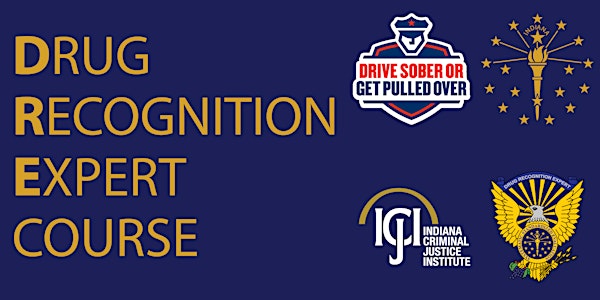
Indiana DRE School: July 8-19, 2024
ICJI Drug Evaluation and Classification Program (DECP) training of police officers as Drug Recognition Experts (DREs)
Date and time
Location
5150 N Post Rd
5150 North Post Road Indianapolis, IN 46226About this event
This training requires an application to be completed. Once you register additional information will be provided.
Completion of the two-day Advanced Roadside Impaired Driving Enforcement (ARIDE) course is required to attend the Indiana DRE School.
The selection process may include documentation of DUI arrests, letter of reference from a current DRE, letters of support from attendee's Departmental Training Supervisor and/or Prosecutor's Office.
The Drug Evaluation and Classification Program (DECP) trains police officers and other approved public safety officials as Drug Recognition Experts (DREs) through a three-phase training process:
Drug Recognition Expert Pre-School (16 hours)
Drug Recognition Expert DRE School (64 hours)
NOTE: The Pre-School and DRE School are run as consecutive classes. A Pre-School assessment is given. Those students not scoring an 80% or better on information covered during the first two days will not continue to the eight-day training that will begin that follows.
Drug Recognition Expert Field Certification (Approximately 40 – 60 hours)
---------------------------------------------------------------------------------
2024 DRE School Dates and Location:
- July 8 - 19, 2024 (with Field Certifications August 21-27, 2024)
- Training Site: Fishers Police Department, 4 Municipal Drive, Fishers IN 46038
The training relies heavily on the Standardized Field Sobriety Tests (SFST’s), which provide the foundation for the DEC Program. Once trained and certified, DREs become highly effective officers skilled in the detection and identification of persons impaired by alcohol and/or drugs. DREs are trained to conduct a systematic and standardized 12-step evaluation consisting of physical, mental and medical components.
Because of the complexity and technical aspects of the DRE training, not all police officers may be suited for the training. Experience has shown that training a well-defined group of officers proficient in impaired driving enforcement works well and can be very effective.
The DRE classroom training is designed to assist the student achieve three broad goals and eight specific learning objectives.
Goals:
1) Determine if an individual is under the influence of a drug or drugs other than alcohol, or the combined influence of alcohol and other drugs, or suffering from some injury or illness that produces similar signs to alcohol/drug impairment;2) Identify the broad category or categories of drugs inducing the observable signs and symptoms of impairment; 3) Progress to the Field Certification Phase of the training.
Objectives:
1) Describe the involvement of drugs in impaired-driving incidents; 2) Name the seven categories of drugs and recognize their effects; 3) Describe and properly administer the psychophysical examinations used in the DEC Program procedures; 4) Document the results of the DRE evaluation; 5) Properly interpret the results of the evaluation; 6) Prepare a narrative drug influence report; 7) Discuss appropriate procedures for testifying in a DRE case; 8) Maintain an up-to-date relevant Curriculum Vitae (CV)